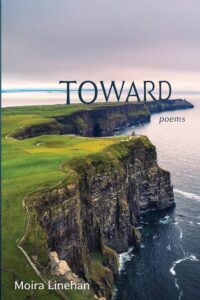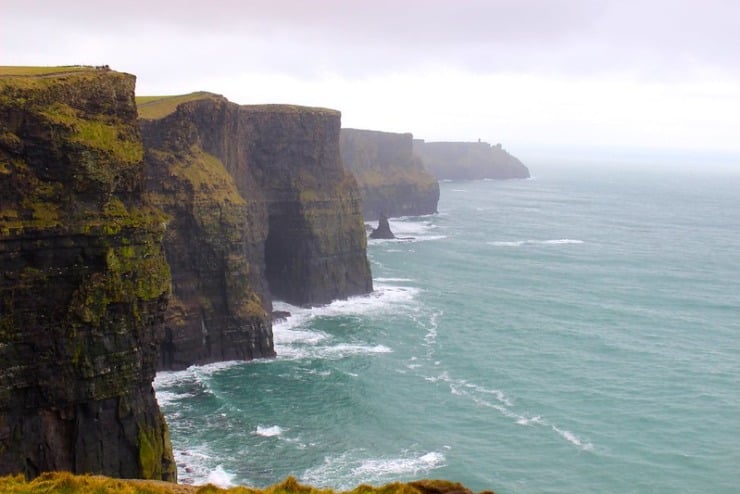In her poems, Moira Linehan shared her gift of simplicity
Moira Linehan Ounijan (1945-2023) published four collections of poetry during her lifetime: If No Moon (2007), Incarnate Grace (2015), Toward (2020), and & Company (2020). She had been a high school English teacher and later an administrator in both technology and academia, but it was her love for poetry, and her work as a poet, that stirred her heart.
Reading Linehan’s poems in Toward, it’s easy to see her heart stir. It’s a simple heart, and a wise heart. She sees what too often becomes apparent only in old age — the beauty of the earth, the importance of small things, and the details we tend to overlook or miss in the pell-mell rush of youth and middle age. She is a poet who’s comfortable in her skin; what she observes is not about self but about landscape, others, and time.

Moira Linehan
The 30 poems (some long, some short) in the collection are organized into three parts. Part One is the poems written during her writing residencies in Ireland. Part Two comprises poems about grief, travel, and culture, including a poem about the stage play and movie The Music Man. It rocketed me back to my 8-year-old self, when I accompanied my parents (who couldn’t find a babysitter on a school night) to a little theater production of the show. Between that and the 1962 movie with Robert Preston and Shirley Jones, the song lyrics were forever imprinted on my brain. Reading Linehan’s poem, I realized someone else knew the lyrics as well as I did.
Part Three of the collection is something of a return to Ireland, at least in memory or future hope, as the poet yearns for another visit. Other subjects are addressed in this section as well, but the poems about Ireland tend to linger more.
The title poem, one of the shortest in the collection, is placed at the end of Part One. Linehan is at the Tyrone Guthrie Centre in County Monaghan. The county is in the Republic of Ireland but shares more of its border with Northern Ireland (geographically, it’s in the province of Ulster). The poet is walking the landscape, including the perimeter of the lake on the center’s property. Her mind is on language, specifically the language of the area that’s been lost. She adroitly turns it into the poem’s theme.
Toward

walk a mile away, walk the wooded path
along the lake and out onto the lane
winding between muddy green hills. I’m nowhere
but among mournful cow, their eyes bottomless
wells that know a soul’s dark nights. All their lives
cows stay put. One foot to the next I keep
moving, an end point always in mind: village,
next hillock, rounding the lake’s loop. On I walk
without being able to say why I must.
The language here has been lost, words like woods
cut down, hauled off, or abandoned. Yet
something remains of those who spoke it. What
has always been beyond words, even when
they had their own. That’s where I’m headed.
Linehan received degrees from St. Louis University and Simmons College, and a M.F.A. degree from Vermont College of Fine Arts. Her poems have been published in numerous literary journals and magazine, including Alaska Quarterly Review, Green Mountain Review, Triquarterly, Notre Dame Review, and Indiana Review, among others. She was also a resident at the Virginia Center for the Creative Arts; the Millay Center; the Cill Rialag Project in Ballinskelligs, Ireland; the Tyrone Guthrie Center; and the Helen Riaboff Whitely Center. She lived in the Boston, Massachusetts, area, and died in 2023.
Simplicity is a gift, and simplicity in writing even more so. Linehan possessed that gift, and it shines in every poem of Toward. You feel the loss when a beloved poet or writer dies, but in Linehan’s case, we have her poems. And they are lovely indeed.
Photo by DHuiz, Creative Commons, via Flickr. Post by Glynn Young.
How to Read a Poem uses images like the mouse, the hive, the switch (from the Billy Collins poem)—to guide readers into new ways of understanding poems. Anthology included.
“I require all our incoming poetry students—in the MFA I direct—to buy and read this book.”
—Jeanetta Calhoun Mish
- Poets and Poems: Sandra Marchetti and “Diorama” - April 24, 2025
- Poets and Poems: Christina Cook and “Roaming the Labyrinth” - April 22, 2025
- Longfellow’s “Paul Revere’s Ride”: Creating a National Legend - April 17, 2025


Leave a Reply